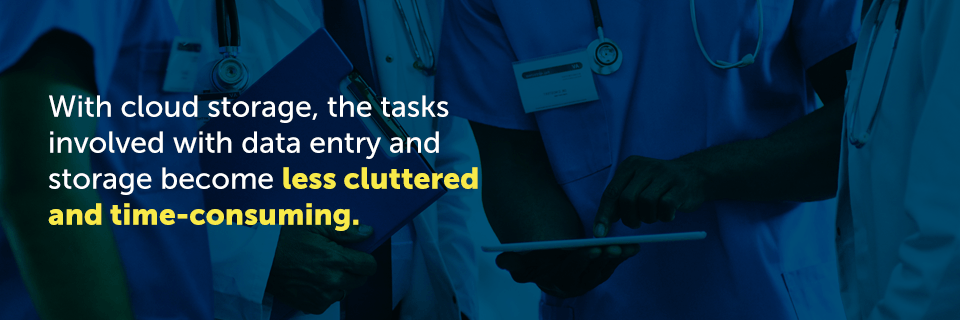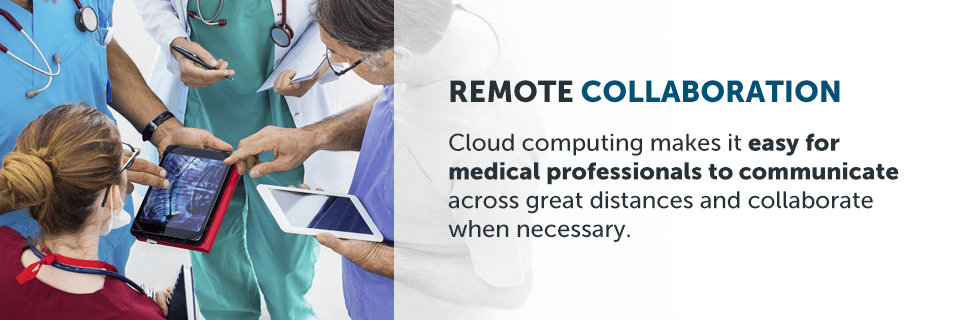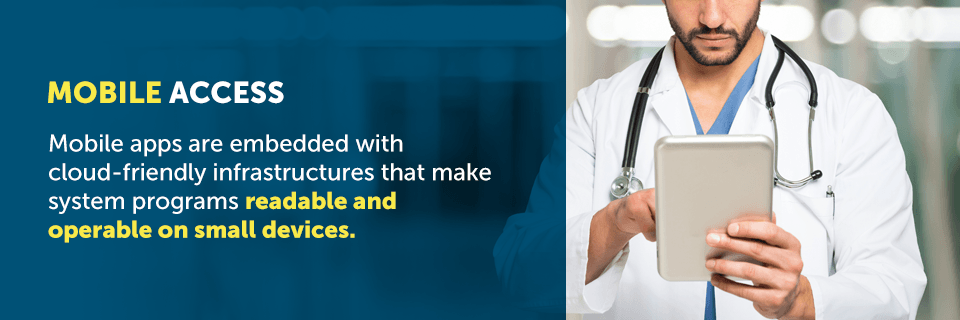
How Cloud Computing is Revolutionizing the Healthcare Industry
Cloud servers have transformed how companies store data and exchange information with authorized personnel. Thanks to the infinite space cloud servers provide, many companies are trimming computer departments and IT staff, reducing overhead. Cloud computing has collaborated with the Internet of Things, which enables digitizing and programming various objects to communicate with centralized information servers.
Cloud computing has been valuable for healthcare information technology at medical establishments. The modern solution allows hospitals to file and access electronic health records at the push of a button without the need for physical documents. With customizable cloud-based approaches, hospital staff can access the database from any location and connected device. Information exchange between hospitals happens over a cloud system without the risk of leaking sensitive physical documents.
Limitless Storage
The primary importance of cloud computing lies in its storage capacity. It provides infinite data storage in one place, unlocking additional benefits like scalability. Since this storage space is virtual, there’s no need to rent physical space for archived records or expand your on-site storage footprint. All the information your authorized personnel stays instantly accessible at the point of treatment.
With unlimited cloud storage, hospitals can also eliminate unnecessary and insecure paper documents. Instead of sifting through drawers and alphabetized surnames, hospital staff can search for the patient record electronically and have it in front of them in just seconds. Organizations can easily transition older physical medical records into electronic ones as well, saving on storage space and speeding up access regardless of the record’s age.
Improved Efficiency

All healthcare organizations accumulate substantial information daily. Whether your organization is large or small, you’ll have significant data to file away for future access and safekeeping. With cloud storage, the tasks involved with data entry and storage become less cluttered and time-consuming.
Cloud storage processes and retrieves patient data in a matter of seconds. Since the data exists on a remote server, you only need to make hard copies when necessary, such as when patients request physical records. Otherwise, you can conserve paper, free up storage space and save on printing costs. There is less need for paper stacks, toner and room after room of filing cabinets. Cloud-based data entry and retrieval are also more accurate since there’s less potential for human error.
Cloud computing security services make it easy for authorized staff to log into a database, access pertinent info, input new information and pull up different files with a few clicks, all without risk of damaging or misplacing physical records.
More Inclusive, Thorough Research
The cloud promotes access to an infinite supply of information about a patient’s medical background at a moment’s notice and expedites the process of any routine appointment. You can even access data about new patients with greater speed.
Cloud computing also provides immediate access to condition-specific information, like symptoms and standard of care. If a patient shows a strange set of symptoms that are difficult to identify, it’s easy to retrieve all existing science on the symptoms in question and quickly narrow it down to the most likely matches.
Cloud computing systems and applications in healthcare also support better patient satisfaction with care, higher accuracy and better clinical outcomes. These systems empower doctors to answer a wider array of patient questions and concerns while also getting more diagnoses right the first time.
Remote Collaboration

Cloud computing also promotes more effective collaboration between team members when they’re geographically separated. Instantly communicate about the medical history of a new patient who has relocated from far away or request a records transfer through secure channels. As cloud computing in healthcare continues growing, patients’ lives improve, and hospitals provide better care because information is more readily available when needed.
This innovative technology also facilitates collaborations between different medical entities with a shared goal, such as when an outbreak occurs, and doctors hurry to identify and contain the problem. If a highly contagious virus erupts in several cities simultaneously, doctors at different organizations can digitally and quickly communicate to organize their response.
Instant Upgrades
In cloud computing, tools and software programs can be upgraded instantly. The moment a new patch or generation of software gets released, third-party techs from a healthcare software development company will update your system without disrupting your operations.
This process stands in marked contrast to the delays and errors large, in-house IT staff sometimes encounter. Issues can arise when software programs need upgrades across the system in traditional networks. Often, computer rooms consist of towers and peripherals purchased at different times. Consequently, system upgrades might not be universally accepted across the network, especially if the equipment involved is from different generations.
With the applications of cloud computing in healthcare, you can rid your offices of outdated computer equipment and get all your computing needs met by a third-party server that your staff can remotely access on today’s mobile equipment.
Mobile Access
One of the greatest assets of cloud computing is that it is accessible from any location with Wi-Fi. Users can access cloud servers using compact, portable devices. As such, medical staff can communicate and coordinate tasks from different locations. If a staff member needs information a colleague knows, they can instantly communicate, regardless of distance.

Mobile apps are embedded with cloud-friendly infrastructures that make system programs readable and operable on small devices. With cloud computing, collaborating staff can interact and remotely work together regardless of which device they use to access the server. A three-way conversation can easily occur between an in-office team member on a computer, a second working from home on a laptop and a third on a smartphone while traveling.
Security and Privacy
Cloud computing helps hospitals and medical organizations comply with regulations, and the security is even better because there is less risk of data theft. Today, cloud services follow standards like the Health Insurance Portability and Accountability Act (HIPAA). As a result, medical organizations can retain maximum levels of security and privacy while enjoying more accessibility and efficiency.
In a medical organization, staff can misplace physical files, or bad actors can steal them. Fires, floods or other natural disasters can also cause paper record loss. With cloud computing, you reduce the risk of loss because everything has a digital backup. Cyber criminals illegally accessing the system leave a digital signature that can help track and capture them.
Cloud computing and data security go hand in hand — HIPAA-compliant cloud computing enables medical organizations to leverage the numerous benefits of remote data storage while adhering to the industry’s legal guidelines.
Reduce Costs
Significantly slash overhead costs associated with computers and IT staff with little need for a massive, in-house computer network by partnering with a third-party service provider to handle the functions requiring a local network. You can dispense with outdated computer equipment and free up space for other purposes. One leading healthcare organization saved $50 million — an impressive 20% of its budget for annual IT operations — by migrating its applications to the cloud.
With a cloud service, you have a reduced need for in-house IT staff because such tasks would get handled at the server’s end. If a program needs implementing or updating, service technicians from a remote location will handle those tasks. Instead of retaining a full-time IT staff, you could pay to have an IT technician visit your site on an as-needed basis if and when a technical issue arises.
Scalability

Cloud computing enables organizations to scale their operations based on shifting demand. You could scale up at minimal cost as your facility grows and you accept new influxes of patients, expand your staff and build new additions to your hospital premises. Long-term care management software can accommodate a hospital database of virtually any size.
With traditional computing, scaling is more challenging and costly due to the equipment and staff involved. Upgrades historically meant more computers and a larger IT staff. Associated computer upkeep costs can also be challenging. Universal system updates usually require a uniform set of machines, which means simultaneously replacing those that aren’t compatible. Cloud computing can help you avoid these and other scalability issues.
Maximum Functionality During Disasters
When disasters strike, hospitals are among the most necessary resources. If a fire or flood occurs, cloud computing simplifies and hastens communication between on-site hospital staff and first responders. As ambulance crews tend to the injured, medical staff can relay information in real time. If a less-experienced responder needs advice, other team members can immediately send them lifesaving instructions.
Cloud computing also makes it easier to weather the brunt of a disaster on-site. Vital data and patient records remain intact because a remote cloud server securely stores them in digital form.
Improved Remote Patient Care
Cloud computing makes it easier for medical providers to deliver care when and where patients need it. A medical professional can review a patient’s condition and order treatment simply by logging in. If a question requires the input of off-site providers, the healthcare expert can easily contact their colleagues for answers.
Cloud computing applications also allow patients to communicate with doctors from the comfort of their homes. Patients with conditions that require regular monitoring can send updates to the medical provider from their living room.
Streamlined IT Services
Long-term care technology has undergone tremendous improvements in recent years thanks to the rapid advances in cloud computing. Just a decade ago, hospitals could only use phones, fax machines and postal mail to communicate. While the internet simplifies communication, security concerns often challenge the digital revolution. Cloud computing changed this with the opportunity to store and immediately access patient information by authorized users, wherever their location.
Trust Prelude Services for Cloud Computing in Healthcare
Regardless of the size of your medical organization, having access to IT experts is essential. Prelude Services is a leading cloud computing service provider offering IT strategic planning, support and management to over 700 healthcare organizations throughout the United States. Contact us today to learn more about how our services can transform your healthcare practice.
CONTACT PRELUDE SERVICES FOR 24/7 IT SUPPORT
Technology has become a crucial part of the modern business experience. Without functional computers and mobile phones, many business practices would grind to a halt. Unfortunately, breakdowns and malfunctions are an inevitable part of any machine, meaning businesses do grind to a halt until the issues are fixed. In order to keep your business running, it's crucial to have access to IT support when you experience technical difficulties.
If you're a healthcare company, long-term care provider, or small business in need of IT support at all hours, consider Prelude Services. We're a SSAE SOC
Compliant business dedicated to improving your security and functionality. We offer specific IT services for senior living care, nursing homes, retirement home services and assisted living, including 24/7 IT support. If you want to know how Prelude can help you, contact us today!

